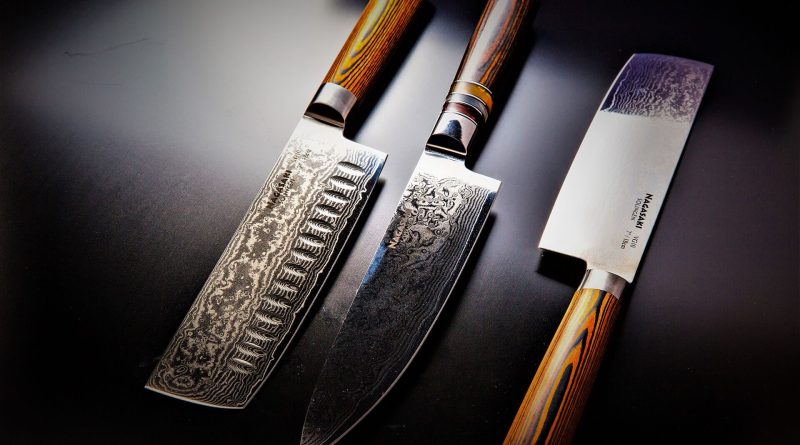Damascus knives Set
Cooking is an art, true connoisseurs of this type of activity are convinced. Cooking is a true ritual that brings aesthetic pleasure. Professional chefs and those who love to cook know firsthand how important it is to have quality knives in the kitchen. For centuries, the best blades have been made of Damascus steel. These knives are truly unique, durable, extremely sharp, and a joy to work with.
The Origin Story
Since ancient times, the Japanese have used Damascus steel, a special technology used to make samurai swords. The core was made of very hard high carbon steel and the bushes were a “soft” stainless steel alloy. The result was a very strong blade that was durable, flexible, and sharp with a unique “living” engraving on the blade. Such a knife is less susceptible to corrosion than products made of high carbon steel without any additional processing (due to the high iron content in the alloy). In the past, each of these knives was made by hand. A blacksmith spends many years making a single blade.
With the advent of blast furnaces and the development of metallurgy, Damascus production declined significantly. For some time, the art of making this type of blade was lost almost all over the world, except in Japan. Damascus has always been and will always be the best steel in this country. For a time, Japan was isolated from Western influence, and thus preserved its traditions. When the borders were opened, local artisans did not abandon Damascus production but improved it using modern technology. Today’s practice is very different from ancient customs, but acquiring Damascus is always a difficult and expensive task.
Technical production
All steels are alloys of iron with carbon and other additives (chromium, vanadium, molybdenum, etc.). The hardness of the resulting metal varies with carbon content. High carbon steel is very hard and retains its sharpness for a long time, but it is very brittle. On the other hand, low carbon steel is soft and malleable; During operation, the cutting edge quickly bends and dulls.
Japanese Damascus knives set combine contrasts thanks to the use of different types of steel layers. Their number ranges from 3 to 101. The middle layer is the hardest and has a sharp edge, while the other layers are more flexible and provide protection from mechanical damage. By repeated forging and hardening in kilns, followed by manual minimum angle sharpening, chemical etching of the blade, and polishing, it is possible to make a Damascus blade. It is sharp, solid, and durable, and can last for decades without frequent sharpening.
Some consumers wonder what the difference is between Damascus steel and damask steel. Bulat is an original American type of steel, often used in the manufacture of hunting knives. It is made of cast steel with a low concentration of carbon in the center and a high concentration on the surface. Thus, such a blade can withstand heavy loads and be more resistant to mechanical damage than Damascus. These features suit the purpose of the knife. That is, for kitchen knives Damascus is considered the best, for hunting knives – Damascus.
Most professional Damascus knives on the market today are made using Japanese technology. Many European brands buy sheets from Japanese companies for their products.
Possible Disadvantage
Are there downsides to Damascus knives? Perhaps the spanning error can be called the need to take a cautious approach to this thesis. It is important to use it for its intended purpose, store it separately from other appliances, and not use it to open cans and cut frozen food. However, these principles of operation are relevant for any kitchen knife. These requirements are dictated by common sense, and no single product will last longer if it is treated with disrespect.
Consumers are often concerned about Damascus rust. With proper care, the blade will not corrode. However, it is not recommended to wash the product in the dishwasher and soak it in water for a long time, leave it wet after use, and keep it wet on the stand. After using it, it should be washed and dried by hand. A genuine Japanese blade will never rust in this case. But it is unlikely that fake chinos will be wearable for long.
Advantages Of Modern Damascus knives
Manufacturing technology in Damascus is extensive in Japan. In the composition of steel, apart from iron and carbon, there are additional elements that increase wear and corrosion resistance, hardness, and strength. We list the main advantages of these blades:
- Very sharp it is achieved through the use of durable steel.
- It does not need to be sharpened frequently. Well-maintained knives don’t wear and tear over the years.
- Least acceleration angle. The lower this indicator, the sharper the knife and the better the quality of the cut. The sharpening angle of Damascus steel ranges from 15 to 20 degrees. For comparison, most European blades range from 30 to 40 degrees. The slicing process is easy, fun, and requires no effort.
- Unique appearance. The stamp on the sheet is unique and unique to each sheet. The unusual design looks ancient and evokes a mysterious atmosphere.
- stability and reliability. Unlike single-ply stainless steel knives, this blade will last for years.
The excellent performance of the Damascus knife set has always been appreciated by professionals all over the world. It is suitable for beginners, amateurs, and true experts in the field of culinary art. One of the most famous manufacturers in Damascus in the modern market is Knife and knives Company. In our official online store knife and knives, you can buy original Damascus knives set at a good price. The warehouse is located in Washington, delivery is made throughout the U.S.A. We sell only high-quality products, which we receive directly from the factory.



